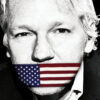
The next time you see a mainstream-media talking-head fawn over Woodward, just remember that if they had any backbone, any moral core, they would be fawning over Assange instead.
If it reports on it at all, MSM has mostly limited coverage to trivialities as a precedent is set to allow journalists globally to be extradited & jailed for exposing embarrassing truths about the U.S. govt., writes Caity Johnstone.
Like Odysseus, upon whom he models his life, the author takes you to places you may wish to avoid but are essential for true sanity, writes Edward Curtin.
Consortium News turns 25 on Nov. 15, 2020. Now would be a great time to show your appreciation for the oldest news site on the web with a generous donation to our 25th Anniversary Fall Fund Drive.